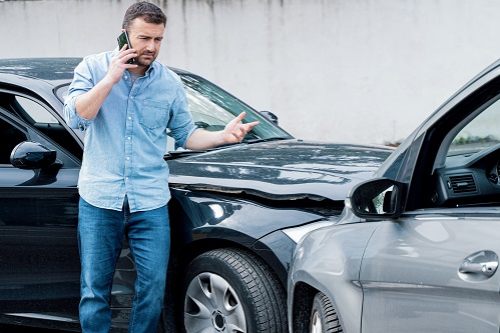- Is it illegal to drive without insurance?
- Myths vs. facts: Driving without insurance
- What happens if you are caught driving without insurance?
- What if you're in an accident and you don't have insurance?
- What if you don’t have insurance but the other driver is at fault?
- Does being caught driving uninsured cause your rates to go up?
- Frequently asked questions: Driving without insurance
Is it illegal to drive without insurance?
Driving without insurance is illegal in almost every state. If you are pulled over or in an accident, you will face tickets, fines and other penalties. You must have a car insurance policy with specific liability minimums in nearly every state.
The only exception is New Hampshire, where state law allows you to drive without insurance. However, you are still financially responsible for any damage or injuries you cause. To meet the financial responsibility requirement, most drivers in New Hampshire choose to purchase car insurance.
People ask
Is driving without insurance a misdemeanor?
Yes, in most states driving uninsured is a misdemeanor. However, it can be considered a felony in some situations, generally for repeat offenders or when an accident is caused by the uninsured driver.
Myths vs. facts: Driving without insurance
- If you get caught driving without insurance, you’ll just have to pay a small fine.
Myth: The penalties for driving without insurance vary by state but can include hefty fines, license suspension, vehicle impoundment and even jail time in some cases. - If you cause an accident without insurance, the other driver’s insurance will cover everything.
Myth: If you're at fault in an accident without insurance, you are personally responsible for all damages and medical costs. The other driver’s insurance may help pay their expenses, but they could sue you for expenses not covered. - If you drive someone else's car, their insurance will cover you; you don't need your own.
Fact: Car insurance includes permissive use coverage, which means if you drive someone else's car with their permission, you are covered by their insurance. However, if you drive their car frequently, you may need to be added to the policy. - Your license can be revoked for driving without insurance.
Fact: Losing your license is one of the most common consequence of driving without insurance. For a first offence, your license will likely be suspended. Repeat offenses may result in your driver's license being revoked.
What happens if you are caught driving without insurance?
Driving without insurance can have significant consequences. In Massachusetts, for example, penalties range from fines to jail time.
“It is a civil motor vehicle infraction and can result in a hefty fine, revocation of your license and possible jail time. In addition, the police can impound your vehicle,” says Peter J. Lombardo, owner and president of PJ Lombardo Insurance Agency in Holden, Massachusetts.
See the chart below for a state-by-state guide to the fines and penalties for driving without insurance.
Penalties for driving without insurance by state
This chart shows the penalties for first-time offenses. Jail time may apply in many states for second or third offenses, but please note that in some states, even a first-time offense may result in jail time.
Many states also impound your vehicle which is an added hassle, both physically and financially.
Some states give you 30 days to produce proof of insurance before these penalties kick in. However, insurance can’t be backdated; you will have to prove that you had insurance at the time of the traffic stop or accident. Buying it afterward won’t get you off the hook.
| State | Fines | Other penalties | Jail time |
|---|---|---|---|
| Alabama | $500 | License and registration suspension | No |
| Alaska | $500 | License suspension | Possible |
| Arizona | $500 | License and registration suspension | No |
| Arkansas | $100 | Registration suspension | Possible |
| California | $100-500 | License and registration suspension | No |
| Colorado | $500 | License suspension | No |
| Connecticut | $100-1000 | License and registration suspension | Possible |
| Delaware | $1500 | License and registration suspension | No |
| District of Columbia | $500 | License and registration suspension | Possible |
| Florida | $150 | License and registration suspension | No |
| Georgia | up to $200 | License and registration suspension | Possible |
| Hawaii | $500 | License and registration suspension | Possible |
| Idaho | $75 | License and registration suspension | Possible |
| Illinois | $500 | License and registration suspension | No |
| Indiana | $250-500 | License suspension | No |
| Iowa | $250 | Registration suspension | No |
| Kansas | $300 | License and registration suspension | Possible |
| Kentucky | $500-1000 | License and registration suspension | Possible |
| Louisiana | $500-1000 | License and registration suspension | No |
| Maine | $100-500 | License and registration suspension | No |
| Maryland | $150-1000 | Registration suspension | No |
| Massachusetts | $500 | License and registration suspension | Possible |
| Michigan | $500 | License suspension | Possible |
| Minnesota | $200 | License and registration suspension | Possible |
| Mississippi | $1000 | License suspension | No |
| Missouri | $20 | License and registration suspension | Possible |
| Montana | $250-500 | License suspension | Possible |
| Nebraska | $50 | License and registration suspension | No |
| Nevada | $250-1250 | License and registration suspension | No |
| New Hampshire | $125 | License or registration suspension if you don’t prove insurance OR financial responsibility | No |
| New Jersey | $300-1000 | License suspension | No |
| New Mexico | $300 | Registration suspension | Possible |
| New York | up to $1500 | License and registration suspension | Possible |
| North Carolina | $50-100 | License and registration suspension | No |
| North Dakota | $150-1000 | License and registration suspension | Possible |
| Ohio | $100 minimum | License and registration suspension | No |
| Oklahoma | $250 | License and registration suspension | Possible |
| Oregon | $265 | License and registration suspension | No |
| Pennsylvania | $300 | License and registration suspension | No |
| Rhode Island | $100-500 | License and registration suspension | No |
| South Carolina | $400 | License and registration suspension | No |
| South Dakota | $100-500 | License and registration suspension | Possible |
| Tennessee | $25 | License and registration suspension | No |
| Texas | $350 | None for a first offense | No |
| Utah | $400 | License and registration suspension | No |
| Vermont | up to $500 | License suspension | No |
| Virginia | $500 | License or registration suspension | No |
| Washington | $550 | License suspension | No |
| West Virginia | $200-500 | License and registration suspension | Possible |
| Wisconsin | $500 | License and registration suspension | No |
| Wyoming | up to $750 | License and registration suspension | Possible |
*Penalty details obtained from individual state government websites, current as of April 2023
What if you're in an accident and you don't have insurance?
If you’re driving without insurance and you get into a car accident, there are serious consequences. The tickets and fines can range from hundreds to even thousands of dollars, and some states impose a jail sentence. Loss of your license and ability to register your car and get affordable insurance in the future are also on the line.
“If you’re in an accident and your insurance has lapsed, the insurance company has the right to deny the claimAn insurance claim is a request you make to your insurance company for coverage after your car is damaged or you have an accident. You can file a claim online, by phone, or in writing. and you will be forced to pay both bodily injury and property damages out of pocket,” Lombardo says.
That means if the damage to another person is $10,000, $20,000, or even $100,000, you are responsible for paying it. If you don’t have the cash, your assets are next on the list to be seized to pay the debt. This is true in any state. Your car, house – anything you own – is on the line to pay your debt.
You will likely have to retain legal services if you owe large amounts of money that you can’t pay.
What if you don’t have insurance but the other driver is at fault?
You can still put in a claim with the at-fault party’s insurance even though you are uninsured. You will still have to pay your own fines and penalties for being uninsured. In some states, you may not be able to recoup the total amount of damages owed to you, but you are still entitled to a claim. Always stay at the scene and fill out all necessary paperwork.
Does being caught driving uninsured cause your rates to go up?
If you’re caught driving without insurance, you may face higher rates because you are now considered a risky driver.
“In addition to the surchargeAn increase in your auto insurance premium due to an at-fault accident or a moving violation. Learn more about how a surcharge affects your auto insurance premiums. you will likely receive, most companies also ask if your current or prior insurance has lapsed. If it has lapsed, it will be both more expensive and more difficult to find insurance companies willing to insure you,” Lombardo says. The same is true if you never had insurance in the first place.
The more times you are caught, the worse things get. In addition to higher insurance rates, tickets, fines and penalties get harsher.
The fine in Massachusetts for a second offense is pretty steep.
“A second offense can result in a maximum fine as high as $5,000, in addition to possible loss of license, possible jail time,” Lombardo says.
Many states will require you to file an SR-22 if you have been caught once without insurance. This form proves that you now meet the state’s financial responsibility requirements.
Remember, having a vehicle registered in your name means you must carry insurance for that vehicle. If you don’t have your own car, you can look into non-owner car insurance. This will cover a certain amount of liability if you get into an accident in someone else’s vehicle. It doesn’t cover damage to the vehicle, it covers injury to another person or damage to their property. It might be a good idea if you borrow someone else’s car or rent cars frequently.
You may think skipping car insurance is a good way to keep your monthly costs down, especially if money is tight. It’s a huge risk to take and almost always backfires; you will end up paying out of pocket for damages and fines.
Frequently asked questions: Driving without insurance
Do you go to jail for driving without insurance?
Yes, it is possible to get jail time for driving without insurance. It usually doesn't happen for a first offense, but it depends on the circumstances and state law.
Is driving without insurance a crime?
In most states driving without insurance is considered a misdemeanor, punishable by fines, loss of license and in some cases, jail time.
Do you get points on your license for driving without insurance?
Yes, you can get points on your license for many minor and major traffic violations in many states, and driving without insurance is one of them.
Can your license be suspended for driving without insurance?
Yes, your license and car registration can be suspended in many states for driving without insurance, in addition to fees and surcharges that must be paid to get them back.






